#seerut chawla
Photo

When you can’t use “is,” "identifies as” is a way of hiding “is not.”
#Seerut Chawla#identify as#identity politics#identity labels#language games#language manipulation#corruption of language#religion is a mental illness
379 notes
·
View notes
Text

Let's put things in perspective now and then...
Source: Dr. Seerut K Chawla Instagram Page
#self help#seerut chawla#self esteem#mental health#philosophy#healing#relationship#not good enough#emotions#grief#loneliness#pain#acceptance#approval#likeable
6 notes
·
View notes
Text
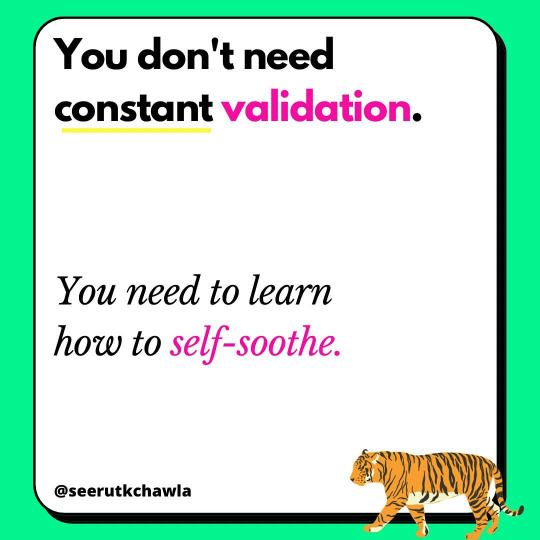

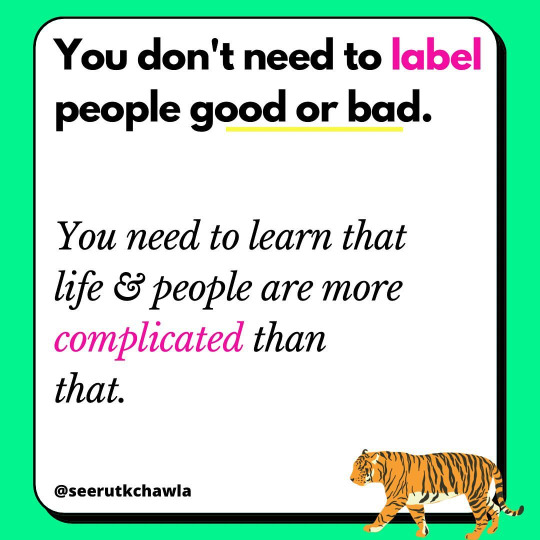
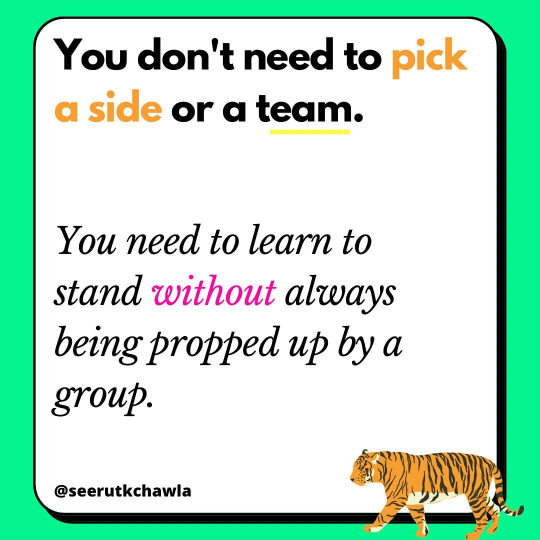
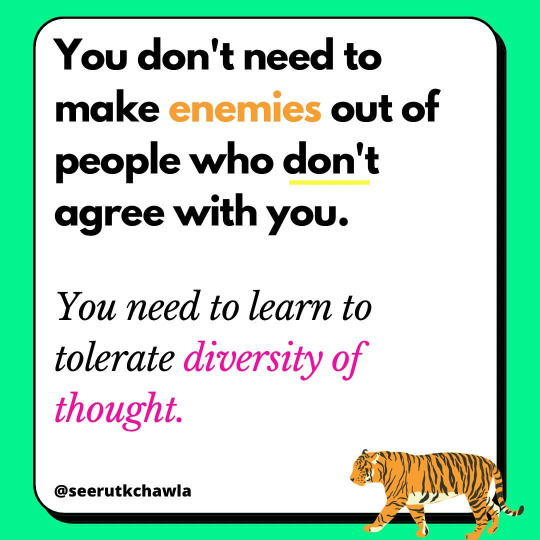
seerutkchawla ~ Instagram
#seerutkchawla#Seerut K Chawla#maturity#personal responsibility#emotional regulation#validation#self soothing#tolerance#differences#labelling#group think#infantilism#cancel culture#personal growth
186 notes
·
View notes
Note
I was reading back through some of your old posts and ran across the term "crypto-terf" and had a moment of recognition concerning a type of account I keep seeing especially on Instagram. There's like this whole cohort of anti-cancel culture people whose posts are all full of buzz phrases about civility and nuance and not using punitive measures to try to change people's minds, and some of them even succeed at making valid points, but like 99% of the time if you go deep enough into any of those accounts you'll stumble across random, thinly veiled transphobia. Never anything overtly hateful, but lots of "just asking questions" shit and efforts to reframe their terfdom as resistance to joining a cultural trend. They're also obsessed with the word "heterodoxy." It's so consistent that I'm instantly on guard when I find an account like that now.
Anyway, thanks for giving me a term to clarify what I'm seeing.
oh yeah are you talking about clementine morrigan and seerut chawla and all those mother fuckers??? i used to expend a lot of energy clanging pots together and trying to scare people away from them but i think it's at least more transparent now how much they suck. fucking disgusting people with the most hollow ill conceived ideologies ive ever fucking seen. their whole lives are just a cope. transmisogyny, racism, inability to accept other people's points of view, equating critique someone with making that person kill themselves (and yet they say they oppose people 'overstating harm'???), and holding completely inconsistent beliefs behind a paper thin claim of abolitionism (theyll say fuck the police means we dont act like cops to one another in one breath and then advocate SUING PEOPLE WHO CANCEL YOU FOR DEFAMATION. you know. using the COURTS AND POLICE. in the next breath)
29 notes
·
View notes
Note
I recently questioned a blog about something they regularly post on their feed that didn't sit right with me. I agree I might have worded it a little strongly but the reaction they gave was so extreme it made me wonder how to express your opinion about something that makes you uncomfortable and how to deal with people who drastically act out?
When you address something that you don’t like that someone else has done, you need to be aware of how you’re approaching the subject.
By becoming aggressive on the person, you’re going to get a strong reaction back, which will mostly likely result in them being defensive. So if your aim is to simply piss someone off with no other outcome or you want to give an extremely harsh reality check for whatever reason, that’s when it makes sense. Even that harsh reality check can’t just come out of nowhere- it should be the absolute final straw to react that way.
You need to think about the outcome. What is that you want the other person to understand? Do you want them to accept a mistake, or a different perspective? How can you put that forth without making them feel defensive? If someone had to approach you about it, how would you want them to?
Word things calmly. We don’t know each other’s tendencies, feelings, temperament or cultures on the app. We know how to talk to our friends or family because we know them.
Imo, giving a statement like “I didn’t like this because you always do this and this doesn’t make sense” is incorrect because nowhere do you state what exactly is the issue; why it is an issue; and a suggestion on how something could be better.
Social media is also increasing sensitivity in people which can be dangerous. We’re now dealing with adults trying to “heal” their inner child to a point that they themselves have become childish instead of being grown up (shoutout to @/seerut chawla on Instagram, the only insta-therapist who makes sense). I’ve noticed that most people now have to resort to what I call the Sandwich:
- compliment (“hey you generally do X thing so well and you’re so good at ABC”)
- criticism and suggestion (“but this is something that I felt could be better for XYZ reasons and perhaps ABC would make more sense”)
- compliment (“and I want to thank you/ compliment you on your precious work/ etc”)
^ I use that technique when I’m dealing with highly sensitive people/ I know someone can’t deal with criticism/ someone who I have to be very gentle with.
32 notes
·
View notes
Text
Not to be the guy who talks about the podcasts he listens to, but one of them made me think today. And I am once again using Tumblr to sort though my thoughts.
So I was listening to I Weigh, which is a podcast about mental health, hosted by Jameela Jamil. Interviewing Seerut K Chawla, about many topics really, but most prominently about how we talk about mental health. How it might not be too helpful despite trying to be and pop psychology.
One thing they discussed is how some terms have been watered down to the point where it is hard to even talk about them. How some people have difficulty speaking about their trauma because it is so big, while another who uses the same term talks about not getting pocket money from their parents. Something that seems so small in comparison to growing up in an active war zone.
They also talked about how having bad experiences is not the same as being through trauma. And while that is a valid thing and discussion, I believe a part of the problem about it is how fucking hard it is to get across experiences and how you are really living your life.
I know that I do. It is hard to articulate what my life with the various issues is really like. From the utter embarrasment that is not being able to keep to a shower schedule, because part of it is how to take care of my hair, and even shampoo made for dandruff is hard on my scalp, and then it becomes a issue of scheduling time to do it, I can’t just go shower, it is a THING. It is a commitment while others dob’t even have to think about it.
Sure, I can tell y’all how I cannot go camping in the woods, a thing I actively crave, because having sounds around me when I sleep is so frightening. It is hard to put into words how bothered I am every day by the things that has gone on in my life, how it dogs me. I can say it, but will you even understand? Every mistake, mean comments, the feeling of the hands of five girls pressing me down as they applied makeup on my face last year of 7th grade, the look in my dad’s eyes as he grabbed me from behind and I struck back so hard that he collapsed.
And then there are things like. Sound alarming but it doesn’t feel that way? I sometimes hear a flute in the distance, faint. I know it isn’t real. There is no way that they are in the store at 19.30, and in the forest. I honestly do not believe that I am important enough that a random fluteplayer has been stalking me since I was nine to… what? Mess with me? No, it is an auditory illusion, but saying that sounds scary to people.
All of this I have to articulate to a proffesional, to the point where they understand me, which is a feat of it’s own. How are you going to get sufficent and accurate help? How many of us have not bungled it because while yes you are almost sold in, and then a comment ruins it? Or in the positive case, said a few key phrases that got you the help you needed? You have to preform your need if help to satisfaction and it is exhausting, for BOTH parties. How are you, the person on the recieving end of this going to tell if someones issue is a minor thing about pocket change, or a story about financial abuse with devestating effects? How will you tell if this person wants to do the work that is trying to get mentally healthier, or just have someone that listens to them and coddle their belief that nothing was ever their fault?
Then you add other issues, like location. Do y’all know how few people even have acess to health proffesionals? It is hard to get help here in the sticks. And even in Oslo the public health services are overloaded, been so since before Covid.
So then a lot of us, either in between getting help and realizing we need help try to live our lives because you gotta pay bills and taxes. Maybe the way I cobbled my life together sounds like a nightmare, but like. What am I supposed to do in the meantime?
All of this to say that I partly agree. The way certain terms are washed out is a problem. From accusing people of gaslighting and calling every bad person a narcisist. Hell, I have talked about how dangerous I think it is to spew the rethoric that certain subset of people, including narcisist, cannot get better, because it frees them from being held accountable for their actions. And it makes it hard to communicate when every bad experience is, say, a trauma, instead of saying it was a rough period. However I think what we really need is terminology to communicate accurately and easily how our lives really are. The servere lack is making us turn to these phrases, and as grating as it is, until we have better ways, it is going to stay.
1 note
·
View note
Text
“Maybe you ‘had trauma’ or maybe you WERE wise beyond your years- maybe both.
If all you have is a hammer everything will look like a nail. #inthetrencheswithyou “
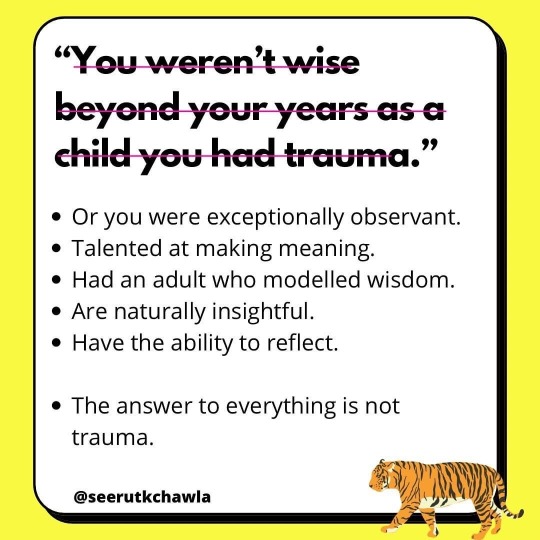
16 notes
·
View notes
Link
I've never heard of this lady but she asked this intriguing question and Twitter's almighty algorithm decided it should grace my timeline and so I couldn't help but read some of the replies.
I'm glad I did because hoo boy.
"What was your woke breaking point?" is the question from this woman, who, by the way, defines herself as a liberal in her Twitter bio
…
As of now there are about 2,000 replies and quote-tweets. Here are 55 of the best, most interesting, and most insane replies (I took the liberty of using screenshots instead of embedding them so this page wouldn't take 7 years to load)
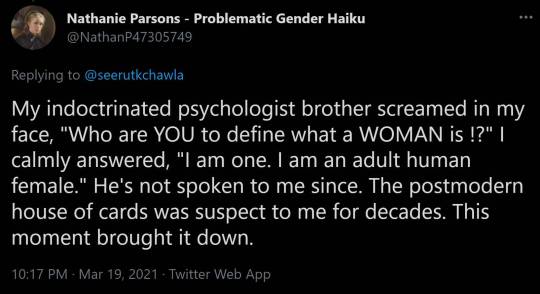
…

…
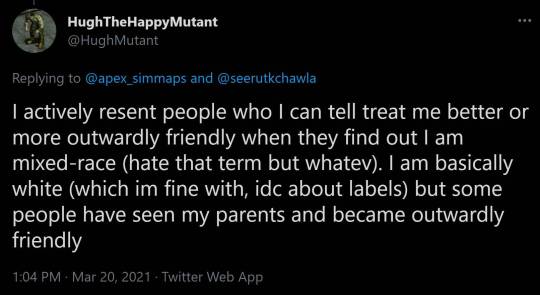
…
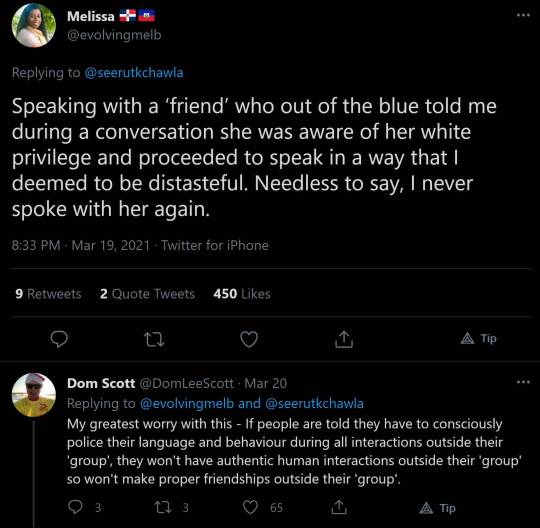
…
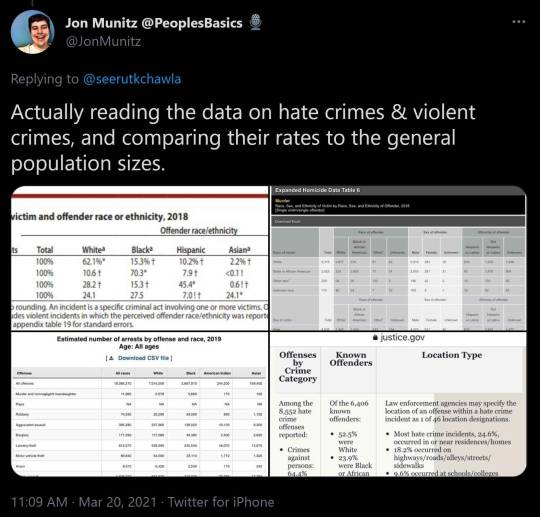
…
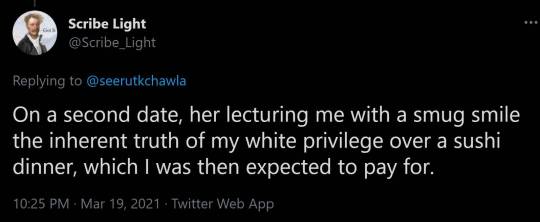
…
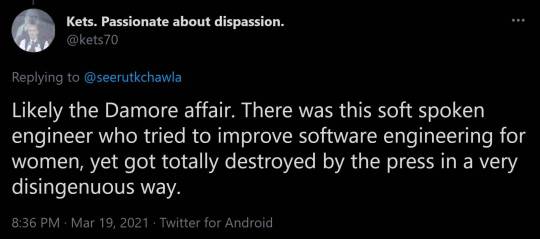
…
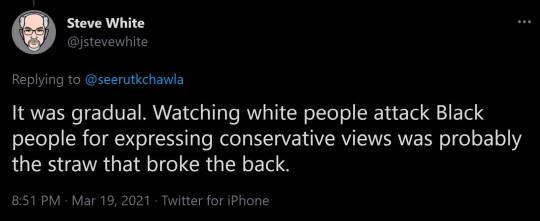
…
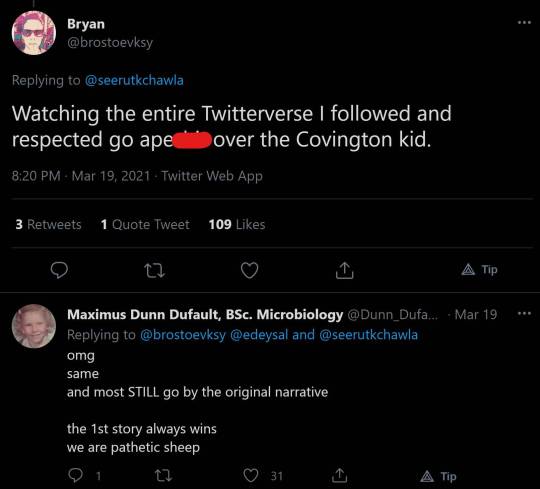
…
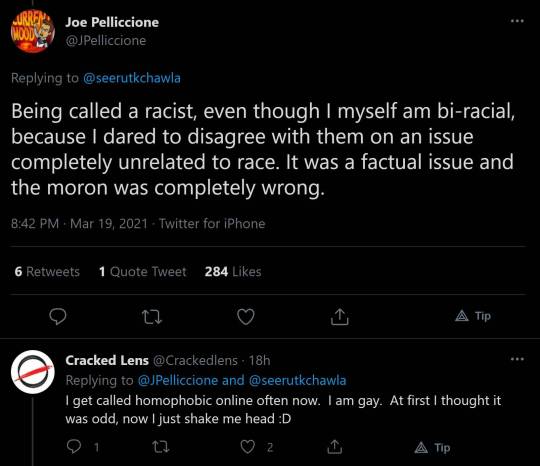
…
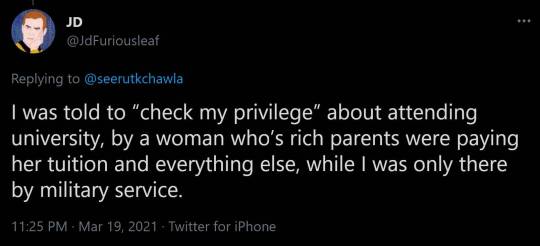
…
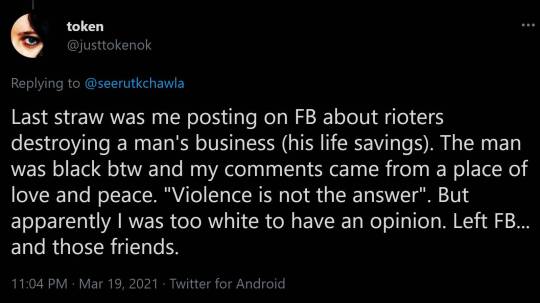
…
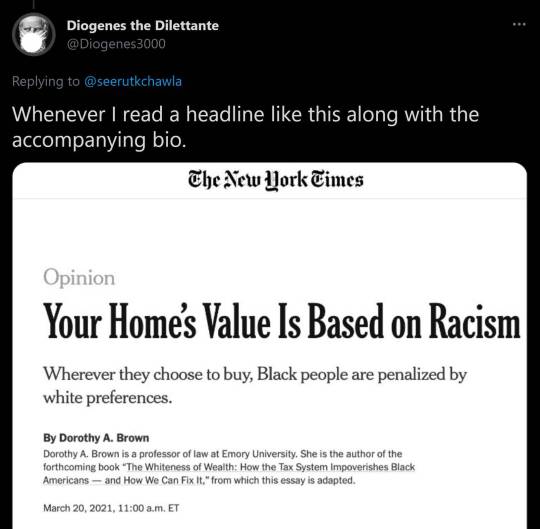
…

…
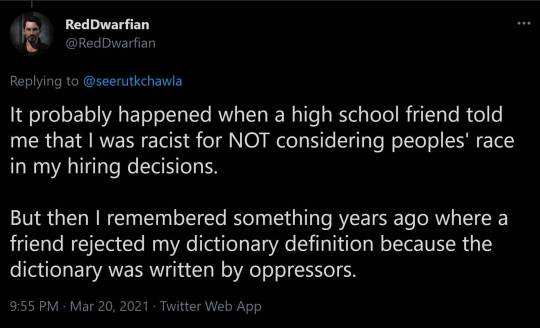
…
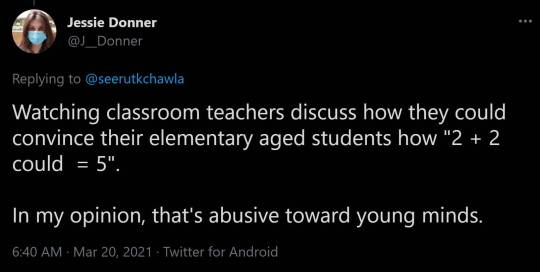
…

…
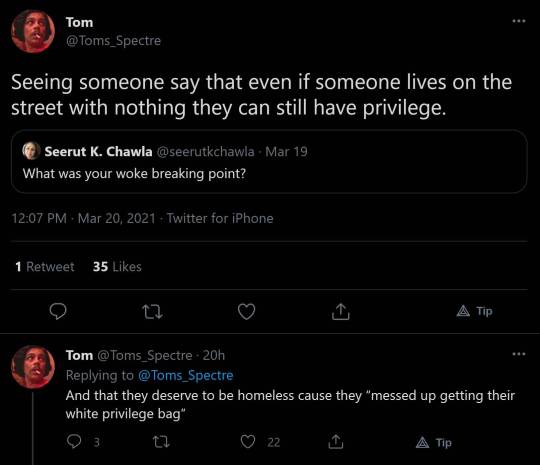
…
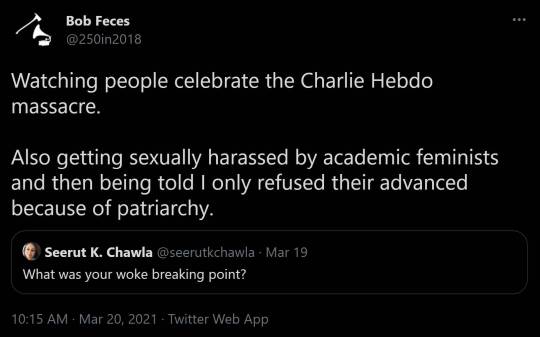
…
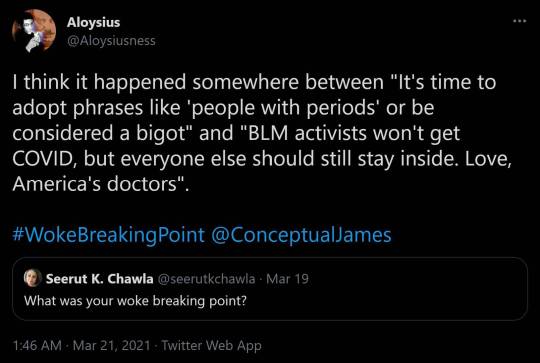
5 notes
·
View notes
Text

"Ultimately, cancel culture has less to do with politics and more to do with character. Decent people don't jump at the chance to publicly shame and destroy others for having an opinion they don't agree with." -- Seerut K Chawla (UK mental health specialist)
#mental health#cancel culture#wokism#covid 19#masks#vaccines#black lives matter#racism#antifa#uk#usa#political correctness
17 notes
·
View notes
Text
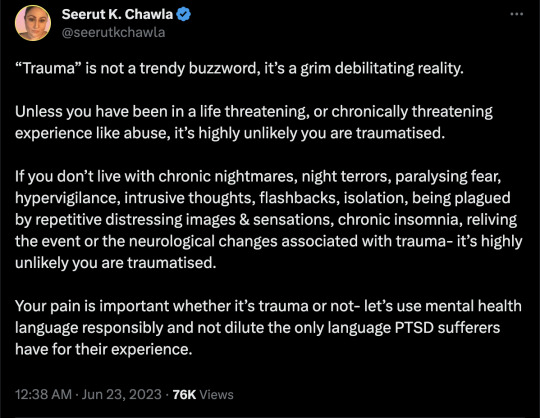
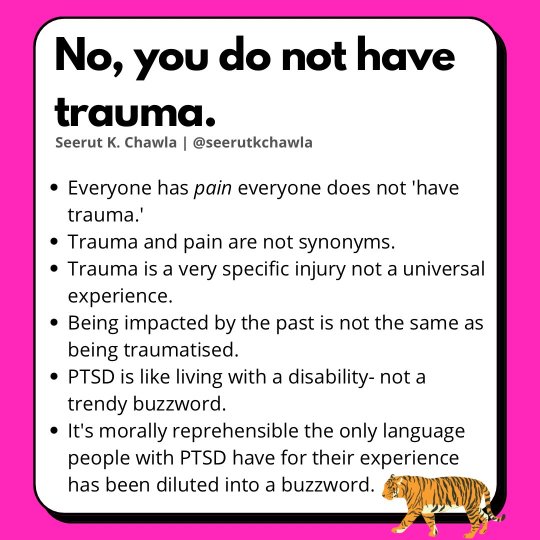
P.S. The people who will get angry at this post don't have trauma; they just say they do for social capital.
#Seerut Chawla#trauma#everyone has trauma#PTSD#psychology#human psychology#religion is a mental illness
81 notes
·
View notes
Text
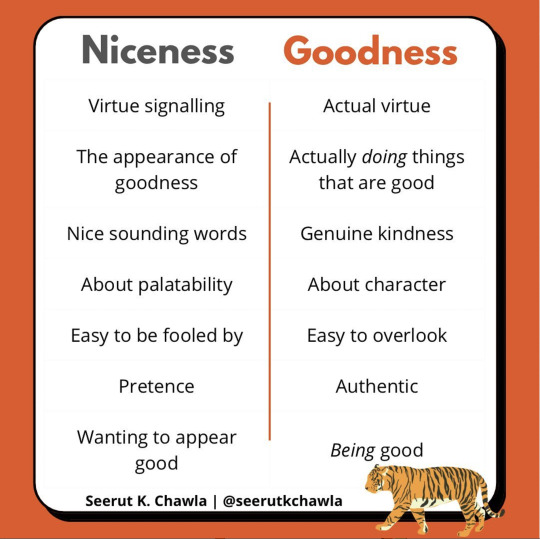
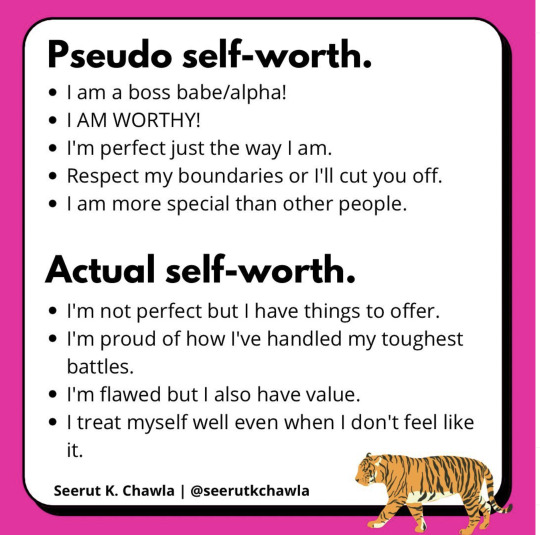
More interesting food for thought and critical thinking advice from therapist Dr. Seerut Chawla.
#critical thinking#food for thought#niceness#goodness#self worth#pseudoscience#pop psychology#seerut chawla#understanding oneself and others#wisdom#tigers
5 notes
·
View notes
Text
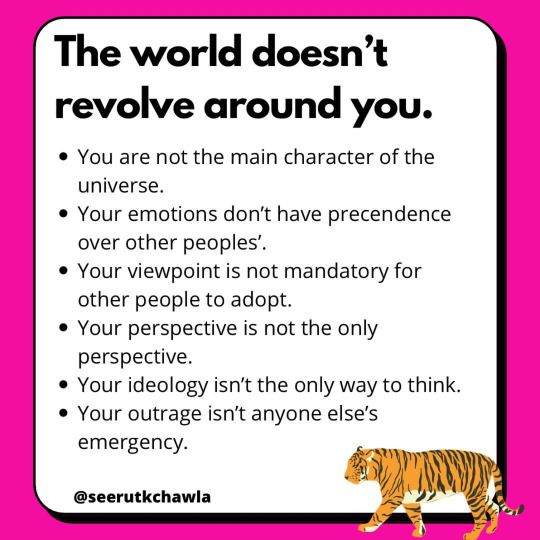
seerutkchawla ~ Instagram
#seerutkchawla#Seerut K Chawla#personal responsibility#responsibility#self awareness#personal growth#maturity#immaturity#welcome to adulthood#egocentric#egotistical#self involved#self obsession#entitlement#infantilism#nihilism#narcissism#selfish#self victimization#victimhood#offended#terminally offended#outrage culture#cancel culture#woke culture#snowflakes#ideological possession#tyranny#authoritarianism#controlling
755 notes
·
View notes
Text
about me
Bella ✨
Libra Sun
Aries Moon
Capricorn Rising
25 years old💚
eclectic/baby witch
northern hemisphere
future therapist + aspiring author
my favourite things: solitude, nature, being cozy, being in love, sexuality/sensuality, coffee, tea, cannabis, meditation, mindfulness, music, poetry
my hobbies: learning, sleeping, watching Friends and Little House On The Prairie, playing Animal Crossing, researching psychology and neuroscience, writing, blogging, reading, singing, hiking
beliefs & values: agnosticism, mindfulness, nonresistance, patience, humour, pleasure, beauty, vulnerability, generosity, compassion, communication, minimalism
people who inspire me: Jordan B. Peterson, Eckhart Tolle, Thich Nhat Hanh, Osho, Russell Brand, Alan W. Watts, Brené Brown, Melody Beattie, Nedra Glover Tawwab, Sharon Peykar, Annie Kaszina, Sara Kuburic, Seerut K. Chawla, Sonia Sabnis, Maria Sosa, Nicole Addison, Elizabeth Earnshaw, r. h. Sin, Juansen Dizon, Herman Hesse, Marcus Aurelius, Friedrich Nietzsche, Chester Bennington, Marshall Mathers, John Hillstead
practices: herbalism, holistic/naturopathic health + medicine, meditation + mindfulness, yoga, lunar magic, self-love + self-care, cleansing rituals, communion with nature, cannabis use, sound therapy, aromatherapy, massage therapy, bath magic, chakra healing, healing crystals + more!
here is my first formal introduction on this blog in which I share my journey which lead me to discovering witchcraft ✨💛
💗💗💗💗💗
some of my other blogs:
💗💗💗💗💗
embody-love-emanate-light
💗💗💗💗💗
isa-glow-bella-grow
💗💗💗💗💗
bella-wellness-progress
💗💗💗💗💗
isa-reads-bella-books
💗💗💗💗💗
brainstorming-ink
💗💗💗💗💗
2 notes
·
View notes
Note
Can you tell if someone is actually spreading awareness on social issues or if they’re just band wagoning?
I think the answer is you can sort of tell, but sometimes, the people who are being the loudest on social media are also the people doing the most behind the scenes.
I saw this post the other day from trauma therapist Seerut Chawla (@seerutchawla) that I really liked. I’m not a huge fan of her other opinions, but I think this graphic does a good job outlining some of the differences between performative and genuine allyship.
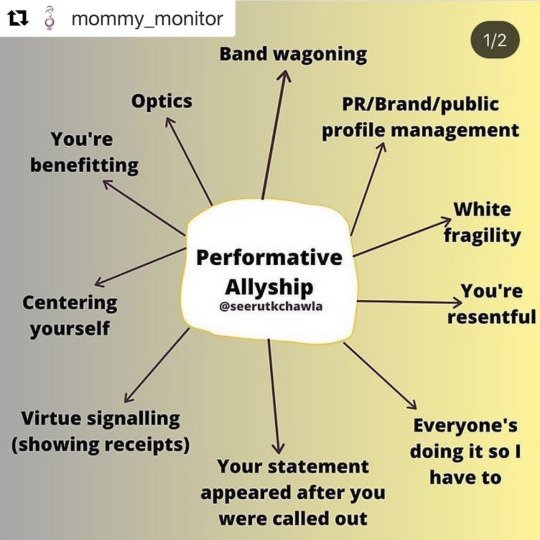
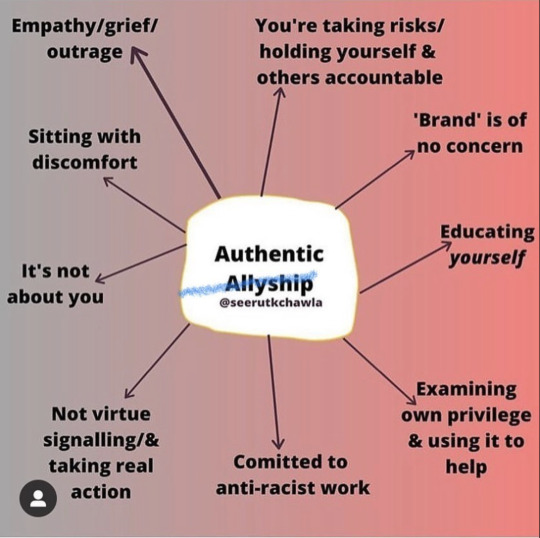
Performative social media posts are frequently simple, express outrage, disbelief, or anger at “the injustice”, avoid acknowledging personal responsibility for systemic issues, and are designed to be met with praise and admiration from people in the poster’s social circle. There is no risk to the individual with performative allyship. It allows people to pat themselves on the back and feel better for “solving the problem” so that they can absolve themselves from the guilt they feel for being part of the problem.
Genuine allyship can involve things like donating money, supporting BIPOC owned businesses, calling out racist behavior in real life as well as online, informing oneself about racism, and changing behaviors without announcing it or seeking praise for it. Genuine allyship often requires sacrifice, whether that’s in terms of money, resources, time, interpersonal relationships, or pride.
Allyship should be something that people do, not something they identify as or a label that they wear. Performative social media posts will often echo what other (white, wealthy people with large followings) have said, without being willing to really engage with the topic at hand or being willing to be wrong.
Posting a black square was the epitome of performative allyship that we’ve seen in the past few weeks. The black squares allowed people to signal that they’re in the know and “woke”, identifying themselves as allies without acknowledging their responsibility for systemic issues or running the risk of saying something wrong. Ironically, as many of you know, the result of the black squares was that the #blacklivesmatter tag on Instagram was flooded over a million black boxes, making it harder for protestors to get the information they needed to safely and effectively assemble. In the interest of being “good allies”, people inadvertently silenced the very community they were trying to help.
However, that doesn’t mean people who posted black squares can’t be good allies. Good allyship is about self-education. It’s about admitting you were speaking and acting from a place that was less informed or less nuanced than you are now. When thinking about posting, here are a few things to consider:
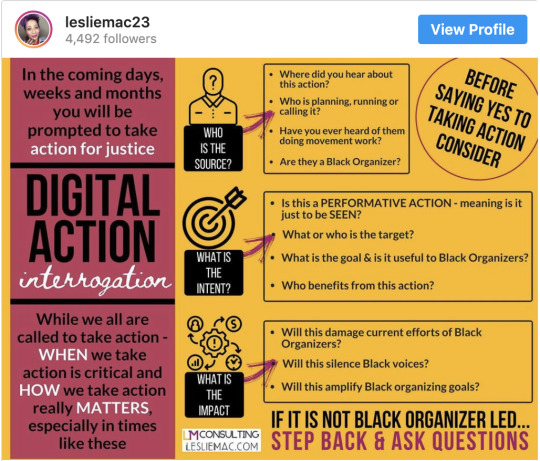
On the other hand, I don’t want to dismiss performative allyship entirely. Being a bad ally or an uninformed ally is better than doing nothing at all, and the fear of not being a “good ally” has prevented a lot of people from engaging with difficult topics at all. If we expect ideological purity from each and every person involved in a movement, we risk alienating everyone. One of the reasons Black Lives Matter blew up this time around was because of all of the performative allyship on social media. It blew up because of all of the people who felt peer pressure to engage, who were desperate for other people to know that they care.
Even among performative allies, the conversation is becoming so much more nuanced than it was just a few years ago. In 2015, the extent of performative allyship was Tweeting that “black lives matter” and then leaving the issue there. Now, even the most performative of allies are linking to resources where you can educate yourself, sign petitions, donate money, volunteer, contact your representatives, and protest. That’s huge. Even if people are entering the journey of allyship for the wrong reasons, by calling them in, we can help them understand what they’re doing wrong and what they could do differently.
So. Keep being part of this movement when the praise is gone. When everyone else on social media has forgotten they cared, keep fighting. Donate. Challenge racist views in your family and in your friend groups. Challenge the racist views that you yourself hold, because you hold some of them. Educate yourself. Protest, or make care packages for the protestors. Sign petitions. Volunteer. Contact your representatives to demand justice, reform, and the freedom of people who were arrested for protesting. Spam police watchdog cameras with videos of your favorite K-pop stars. Use your position of privilege to benefit those who don’t have it. And yes, post on social media. Spreading information and keeping people energized is crucial. But make sure you’re doing it in a way that centers Black movements and Black voices. White people can opt out of caring about police brutality. But POC, and especially Black POCs, cannot. As allies, we have to be here 24/7, 365 days a year, until this problem is fixed. Be a true ally, and don’t let this movement die.
There’s a great article on performative allyship by Holiday Phillips for Forge that I would highly recommend for further reading. You can find it here.
6 notes
·
View notes
Text
"It's hard to feel internally validated if your internal opinion is hard to trust. Doesn't it make perfect sense you would then seek this externally?"
- Seerut K. Chawla
1 note
·
View note
